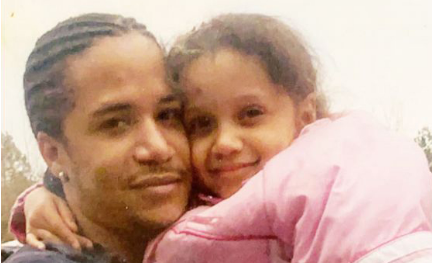Photos: SPLC\Kelvin Silva
In the following article by the Southern Poverty Law Center, the issue of Black immigrants specifically fighting the Guyer Rule is examined. This rule has been used to deny citizenship for many born of fathers who are U.S. citizens–like Black Dominican Kelvin Silva, shown above with his daughter, who is incarcerated in Georgia and awaiting deportation.
Behind the steel gates of a remote immigrant prison in Georgia lies a visitation room where detained people speak to visitors through a plexiglass window. There are messages etched on the visitor’s side – words the detained men and women sitting opposite can’t see.
“Be anxious for nothing,” one message reads. “I’m sorry,” “Jesus,” and “No Borders” read others. They’re messages of hope – a feeling lost for many Black people who are detained at the Stewart Detention Center in Lumpkin, Georgia.
The message with the most power, however, is in Spanish, and it speaks volumes: “Sí, se puede.” The English translation: Yes, it’s possible. Yes, you can.
But this message is pierced with doubt, as people at Stewart and in other immigrant detention facilities across the country fight an uphill legal battle for their release.
Kelvin Silva – one of many Black men held at Stewart – is facing deportation because of an archaic and racially inequitable law known as the Guyer Rule that prevented him from becoming a U.S. citizen as a child, even though his father was a naturalized U.S. citizen. Were it not for the Guyer Rule, Silva – who was born in the Dominican Republic but grew up in the United States – would have automatically gained citizenship when he was just 11 years old.
Enacted in 1940, the Guyer Rule prevented U.S.-citizen fathers, but not U.S.-citizen mothers, from passing their citizenship status to foreign-born, nonmarital children – in other words, children who were born “out of wedlock.” The rule disproportionately restricted how nonwhite parents could secure citizenship for their children – and for decades was maintained for just that reason.
The Southern Poverty Law Center and its co-counsel are representing Silva in a federal court challenge that claims the Guyer Rule is unconstitutional because it discriminates based on gender and race.
“The Guyer Rule exemplifies the same type of anti-father discrimination that the U.S. Supreme Court ruled unconstitutional in Sessions v. Morales-Santana in 2017,” said Meredyth Yoon, a lead attorney with the SPLC’s Southeast Immigrant Freedom Initiative, which is representing Silva. “And although the law Mr. Silva is challenging makes no explicit mention of race, historical records show the Guyer Rule has an unequivocally racially discriminatory purpose, and it has had a disproportionate impact on Black immigrants, not to mention the profound harm it has inflicted on generations to come.”
The racist Guyer Rule originates from an 1864 Maryland court decision, Guyer v. Smith, in which the court ruled that two sons born overseas of a white U.S.-citizen father and a Black mother from St. Barthélemy were “not born in lawful wedlock” and thus were not U.S. citizens. The Guyer Rule was subsequently incorporated into federal nationality laws, first through administrators’ policies and practices, and later by Congress through the Nationality Act of 1940.
Although Black immigrants were eligible for naturalization starting in 1870, historical and legislative records show that lawmakers nevertheless worked to limit the number of people of color who could become U.S. citizens. Across decades when white supremacy, segregation and eugenics undergirded the entire American legal system, administrators and legislators accomplished this goal in a variety of ways, including literacy tests, a racially discriminatory quota system and immigration preference categories that prioritized the “marital” family over other forms of familial arrangement, notably at a time when interracial marriage was illegal in most U.S. states.
In treating marriage as a prerequisite for U.S.-citizen fathers, but not U.S.-citizen mothers, to pass their citizenship status on to their foreign-born children, lawmakers were relying on the outdated stereotype that mothers have closer bonds with their nonmarital children than fathers do.
“These false stereotypes have disproportionally harmed Black communities by preventing fathers from passing citizenship to their children,” said Neyissa Desir, an SPLC outreach paralegal.
Congress repealed and replaced the discriminatory Guyer Rule in the Child Citizenship Act of 2000. But the new law did not apply to children over 18. That means Silva and many other similarly situated immigrants who were prevented from becoming U.S. citizens under the Guyer Rule continue to suffer its discriminatory effects simply because of the year they were born. Had Silva been born on or after Feb. 27, 1983, he would have been under 18 when the 2000 law was passed and thus his citizenship would not be in question.
“Fairness is all I’m asking for,” said Silva, 44. “This is my country – the only country I know.”
‘Immoral and unconscionable’
Silva, who identifies as both Black and Latino, has been detained since July 16, 2019, and he is facing possible deportation to a country he no longer remembers.
But his legal fight is not over. As the SPLC fights in court and urges Congress to overturn the rule, the longtime resident of Charlotte, North Carolina, has the support of his representative in Congress.
“Mr. Silva has an existing petition for review in the Eleventh Circuit, which involves a nationality claim and equal protection challenges to a discriminatory citizenship law, but for which he would stand recognized as a U.S. citizen,” U.S. Rep. Alma Adams wrote in a letter to Immigration and Customs Enforcement (ICE) in April. “It would be immoral and unconscionable, and potentially illegal, for ICE to deport Mr. Silva before the Court has ruled on the merits of his nationality claim.”
The ‘cruelest part’
When Joe Biden was elected president, Silva hoped his dreams of being reunited with his family might come true. He was praying for a “miracle,” Silva told ABC News in December.
But eight months after the inauguration, Silva remains imprisoned at Stewart.
Read rest here.












